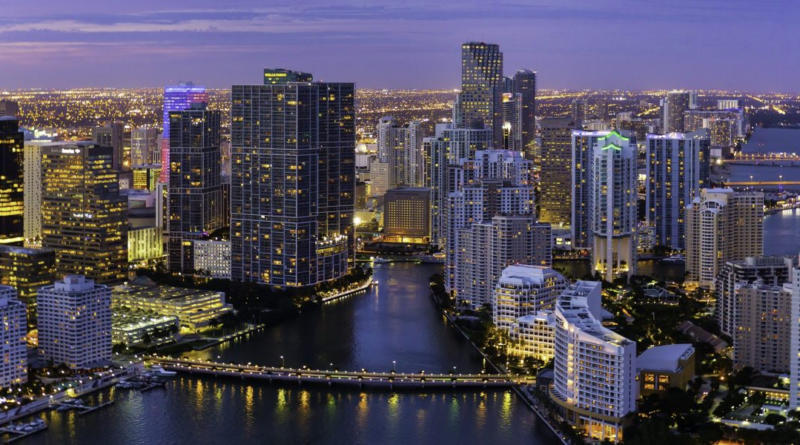Miami's Hedge Fund Week is a January Coachella for 'Wall Street South' as Ja Rule headlines and Peter Thiel and Jared Kushner hold court
No one in New York or LA orders a Carlyle Fresco.
But that’s what they were mixing the other night by the pool at the famed Fontainebleau Miami Beach – a sure sign the hedge fund set was back in town.
The tequila and grapefruit spritz was named in honor of the Carlyle Group Inc., which was one of the sponsors of a conference in the hotel.
And, like so many things in South Florida these days, it smacked of one oh-so-sweet ingredient: money.
At times Miami seemed as if half of American finance had flown in for what’s prosaically known as Hedge Fund Week, a sort of Coachella for the fast-money crowd. The rolling series of conferences and parties swaggers through this area each January, during the height of the Florida winter season.
“Who’s going to close a deal this week? Make some noise!” the DJ at LIV, the thumping mega nightclub in the Fontainebleau, shouted into the mic late Wednesday night. The suits in the crowd went wild.
Now more than ever, the old Wall Street of New York is sizing up what Miami promoters breathlessly refer to as Wall Street South. Even skeptics wonder whether there’s more to this than hype. The pandemic prompted wealthy financiers to flock here for the low taxes and good weather. For now, they’re staying.
Where money goes, politicians follow. As President Joe Biden and former President Donald Trump head toward a likely rematch in November, money and influence are snaking through Miami. Even the city’s annual hedge fund confab gives off a new vibe this election season. This is no longer merely a meeting of money managers. This feels like a gathering of kingmakers.
And this may not be a one-off: Florida has eclipsed California and Texas as the nation’s single largest source of donations to Republican presidential campaigns, racking up $30 million for GOP candidates in 2023.
“They’re all going to be down here raising money,” Nitin Motwani, a derivatives trader-turned-condo-developer, said of presidential candidates.
They’re here already.
As Wall Street partied beachside at the Fontainebleau, Biden raised $6.2 million at a fundraiser a few miles away. Hedge-fund billionaire Henry Laufer, who co-founded the Medallion Fund at Renaissance Technologies with Jim Simons, co-chaired the event. Ninety miles north, in Jupiter, Florida, a group of lawyers raised another $1 million for the president, not far from Trump’s home and private club, Mar-a-Lago.
“Miami is the place where everyone comes out,” said Chris Korge, a prominent Democratic fundraiser and attorney.
The money is flowing in all directions. Some major Republican donors who were previously resistant to Trump have begun to turn toward him. Scott Bessent, former chief investment officer at Soros Fund Management, initially backed Wall Street’s early pick, Florida Governor Ron DeSantis. Late last year, Bessent switched to Trump and donated $250,000 to the former president’s super PAC, according to federal campaign filings.
“Over the summer, I became convinced that Donald Trump can win,” Bessent said.
Others are holding out hope for Nikki Haley since DeSantis dropped out and backed Trump.
The same day Biden was heading to Miami, real estate billionaire Barry Sternlicht insisted America needs a third alternative come November. “We’re people who don’t like the path that the country is on and don’t like our two choices at the moment,” he said on the sidelines of the Fontainebleau conference.
A few miles south, Citadel founder and Miami transplant Ken Griffin said he’d supported Haley’s campaign — later disclosing a $5 million gift — but stopped short of saying he would contribute more to her long-shot challenge. (Other business figures who’ve supported Haley include Henry Kravis, Stanley Druckenmiller and Kenneth Langone).
A familiar line at the parties and conference sidelines is that financial professionals tend to be “socially liberal but fiscally conservative.” Of course, they said the same in 2016, which led to Trump’s presidency and a hard-right shift in the Supreme Court.
A big question for the 2024 election, which both Democrats and Republicans say could determine the future of American democracy, is how the financial donor class will strike that balance now.
No one wanted to talk politics aboard the SeaFair, a $40 million swanky yacht cruising the azure waters of Biscayne Bay.
The occasion: another hedge fund cocktail party. This time, the host was Universa Investments, where Nassim Taleb, of “Fooled by Randomness” fame, is an adviser. Universa founder Mark Spitznagel moved his firm to Miami from Santa Monica, California, years before all the talk of Wall Street South.
Sitting near the open bar, Brandon Yarckin, the chief operating officer, insisted that politics never figures into Universa’s strategy of trying to profit from out-of-the-blue Black Swan events. “We don’t talk about politics,” Yarckin said as the Miami skyline shimmered in the distance.
Taleb avoided the topic altogether. “No, no, I’m not going to talk about that,” he concluded.
One of the 200-or-so guests, Francesca Federico, co-founder and president of Twelve Points Wealth Management in Boston, repeated the socially liberal/fiscally conservative line. As for who wins in November, she said: “A bond is still going to be a bond, a stock will still be a stock.”
Joining them aboard the 222-foot SeaFair was Miami Mayor Francis Suarez, who’s shot to national attention since 2020 by relentlessly selling the idea that Miami might one day rival New York as the US financial center.
It landed him a job at a prestigious law firm and other lucrative side gigs, he launched a failed presidential bid and is facing multiple investigations. On Wednesday, the Florida Democratic Party called on him to resign.
Wall Street South isn’t a dream, Suarez told the crowd. It’s a reality.
Motwani, the developer and another major Miami booster, said that to him, Wall Street South is a state of mind. “We’re running on all cylinders,” Motwani said over the salsa dun of Buena Vista Social Club.
Back at the Fontainebleau, one of the week’s gatherings, Global Alts 2024, was wrapping inside the thronging LIV nightclub.
For two days, conference-goers had sat quietly as the likes of Michael Novogratz, Peter Thiel, Jared Kushner and Shaquille O’Neal went on about how and where to make money. Now, hundreds of them flooded onto the dance floor.
Quaffing gin and tonics, Johnnie Walker Black Label and mediocre white wine, the revelers moved to the beat laid down by the DJ and the evening’s headliner, the early 2000s hit rapper Ja Rule. Later, as Ja Rule (real name: Jeffrey Atkins) lamented his age (he’s closing in on 50), he pulled off his T-shirt to reveal a sculpted six pack.
“Let’s hear it for Global Alts 2024!” he yelled.
Smoke machines pumped. Confetti rained down. Wall Street South danced on.



